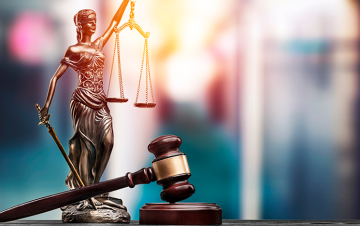Lawyer with 15 years of legal experience, specialization: family and civil law, inheritance, contract law, criminal cases, administrative cases, cases involving foreigners, migration law
Litigation is an important mechanism for ensuring justice and resolving legal conflicts. To ensure the fairness and effectiveness of this process, there are certain rights and obligations for both the parties to the process and the court itself. In this article, we will look at the main principles and procedures that form the basis of the court process in Ukraine.
The rights of the parties to litigation include the following key aspects:
The right of access to court: The Constitution of Ukraine guarantees every citizen the right to a fair trial. The Law of Ukraine "On the Judiciary and the Status of Judges" defines the procedures and conditions for filing a lawsuit.
The right to a lawyer: The Law of Ukraine "On the Bar and Practice of Law" provides each party with the right to be defended by a lawyer. Everyone has the right to choose a lawyer and receive legal assistance in court proceedings.
The right to present evidence: The Civil Procedure Code of Ukraine sets out the procedures for the presentation and consideration of evidence in court proceedings. The parties have the right to present any evidence relevant to the resolution of the case.
The right to justify the decision: The Law of Ukraine "On the Judiciary and the Status of Judges" requires that court decisions be substantiated and contain comprehensive reasons. The parties have the right to be informed of the reasons for the decision and may appeal in case of unreasonableness.
The obligations of the parties are also important to ensure justice and efficient resolution of cases:
The obligation to cooperate with the court: The Civil Procedure Code of Ukraine defines the obligation of the parties to cooperate with the court and to comply with all orders and requirements of the court.
Duty to present evidence: The Civil Procedure Code of Ukraine establishes the obligation of the parties to submit all necessary evidence and documents to support their positions and claims.
Obligation to comply with procedures: The Civil Procedure Code of Ukraine sets out the procedures to be followed by the parties in litigation. This includes responding to a lawsuit, presenting evidence and attending court hearings.
Obligation to comply with a court decision: The Civil Procedure Code of Ukraine establishes the obligation of the parties to comply with the court decision and execute it within the established timeframe.
The court process includes the following main stages:
Filing a lawsuit: The initial stage where a party files a lawsuit with the court.
Case consideration: The court considers the claim and the evidence presented by the parties.
Discussion: The parties have the opportunity to discuss the claim and the evidence presented.
Judgement: The court makes a decision based on the evidence presented and the law.
Appeal: The parties have the right to appeal the court's decision to a higher court.
A lawyer is a key actor in a court proceeding, providing professional legal assistance to the parties and protecting their rights and interests. He/she advises clients on their rights and obligations, represents their interests during court hearings, prepares documents and evidence, and provides legal support throughout the entire legal process.
The rights and obligations of the parties to litigation in Ukraine are fundamental principles that ensure the fairness and efficiency of justice. Adherence to these principles helps to ensure that the proceedings are conducted in a fair and objective environment.
Protection of dignity, lifting of arrest, analysis, representation.
































